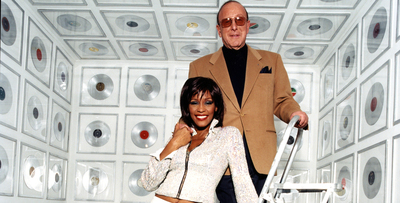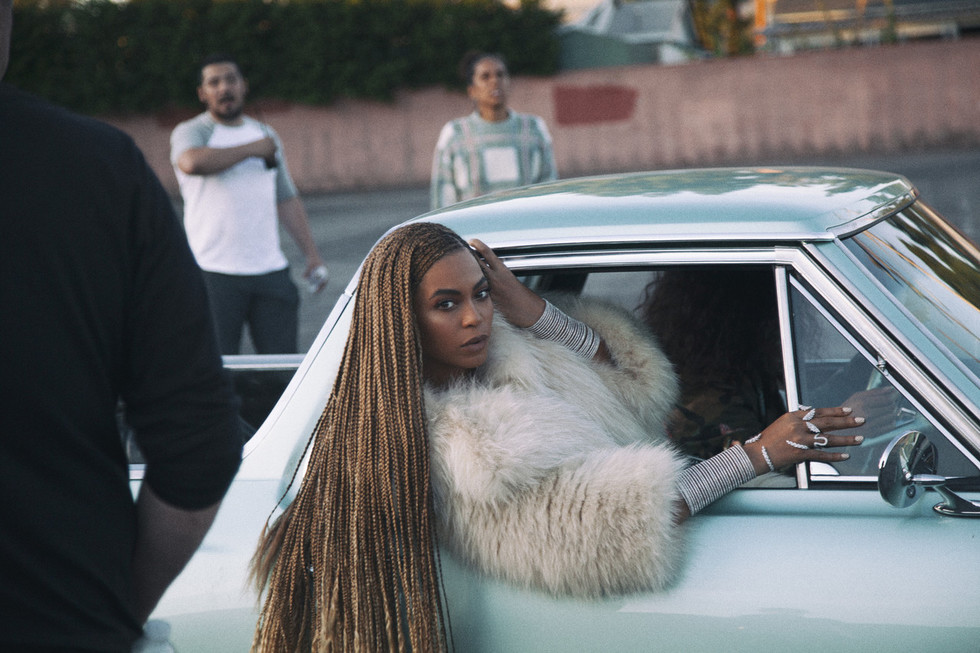
BY MATTHEW ENG |
Beyoncé’s “Formation” Video is One of 2016's Greatest Films
You may have heard about a new Beyoncé video...

I left an afternoon screening of the Coens’ fun but featherweight Hail, Caesar! on Saturday and sensed something indefinable had shifted in the universe. Minutes later, while swiping through his phone, my friend turned and looked at me with wide eyes, his pitch high: “There’s new Beyoncé...”
You may have heard that the Queen of Earth dropped a surprise bounce track entitled “Formation” as well as a video this past Saturday afternoon while the rest of us commoners were partaking in bottomless brunches, discounted matinees, and midday naps. This was followed not long after by a transcendent Black Panther homage of a halftime performance of the same song that instantly rendered the failed Coldplay performance happening around it into a fuzzy, flower-powered memory. But back to the Queen…
“Formation” reckons more provocatively with the past than Hail, Caesar! and connects a multipartite history to our thunderous present more acutely than any number of the acclaimed historical epics vying for Oscar gold this month. It also, quite simply, moves me more than anything I’ve screened so far this year, while further compelling me towards deeper contemplation and critical analysis than mere “YAS, QUEEN!” groupthink, which is of course hard to deny. The video’s spare but substantial cinephiliac references — that ending voiceover from Tia Lessin and Carl Deal’s 2008 Katrina documentary Trouble the Water, those flood shoots that can’t help but evoke Benh Zeitlin’s Beasts of the Southern Wild — inspire me to revisit both the alluded films and Beyoncé’s past works to, respectively, gauge their value within the context of “Formation” and see if I missed anything of import the first, second, or third times around.

Second to only “***Flawless,” the “Formation” video feels like the most explicit act of political artistry that Beyoncé has ever attempted. Directed by video veteran Melina Matsoukas (Rihanna’s “We Found Love,” Beyoncé’s “Pretty Hurts”) and shot with ravishing, multiform versatility by Malik Sayeed, the film is a glitteringly multitudinous feat of defiance, equal parts #BlackLivesMatter and #BlackGirlMagic, but also a subtle, intersectional, yet unambiguous celebration of LGBT identity. Beyoncé isn’t throwing out all those breakneck “Slay”s for nothing and bounce music is itself a unique form of New Orleans’ gay culture. There are also video-only voice cameos from underground queer icons like Big Freedia (“I like cornbread and collard greens, bitchh!”) and the late Messy Mya (“Bitch, I’m back, by popular demand!”), which are political through the sheer fact of their inclusion as the only artists besides Beyoncé to feature in the video, a move similar to Chimamanda Ngozi Adichie’s galvanizing appearance in the middle of “***Flawless.” Like Adichie’s cameo, their voices radicalize the song, but they also ground it in a specific milieu, which Matsoukas’ video only heightens as it attempts to capture a rich, rounded, and buzzing portrait of black Louisiana life that criss-crosses from the boulevards to the bayous.
Filmed in and around New Orleans, where the roots of Beyoncé’s mother Tina have been traced to, the video puts Beyoncé front and center in some of the most subversive imagery the artist has ever put her name on: Beyoncé splayed out on top of a New Orleans police car amid Katrina floodwater, only to later drown with it; Blue Ivy, already gifted with her mother’s unteachable effervescence, serving it with hands-on-hips over the sly rejoinder “I like my baby hair with baby hair and afros”; or, most breathtakingly, a young, hooded black boy break-dancing in front of a line of police officers, who put their hands up in surrender. There’s also that glorious shot of Beyoncé with her middle-fingers up, braids long, tongue out, and eyes covered by the brim of a large hat, accompanied by the track’s most unapologetically sexual and subsequently most talked-about line, “When he f**k me good, I take his ass to Red Lobster.” Assorted clips of black men and women in local churches, beauty shops, and stores also feature in, even though these very clips are the source of one of the video’s primary controversies over rightful credit and usage.
Controversy aside, however, there are a heap of political motives on display here that are electrifying in and of themselves. When taken as a whole, they solidify once and for all that Beyoncé is the Black Feminist Activist she has been identifying as for years now, even if critics still seem much more eager to pick apart her Feminist alliances more than, say, Emma Watson’s, which isn’t entirely unwarranted. In songs like “Like a Boy,” “Single Ladies (Put a Ring on It),” and “Run the World (Girls)” and their accompanying videos, we could discern Beyoncé’s female pride and patriarchal defiance, even if we couldn’t always see to the bottom of what these attitudes were meant to represent beyond mere face value. They seemed removed from any political networks in a way that simply can’t be said about “***Flawless” and now “Formation,” which tosses out reclaimable, racially-charged references to “Bama”s and “negro nose"s faster than many listeners might realize.

There’s also a fascinating synthesis between the visual commemoration of black, specifically Southern womanhood and the candid bravado of Beyoncé’s spitfire lyrics, which call upon her personal life (“I’m so possessive so I rock his Roc necklaces”) and professional one (“I just might be a black Bill Gates in the making”), as though this vast and largely under-seen history unearths the core of the vast and inescapable superhuman we call Queen. It’s videos like these that make us forget that, in spite of our deepest dreams, we don’t really know Beyoncé, whose tactical elusiveness culminated most memorably this past August in her refusal to grant Vogue an interview, despite being their September cover girl. She is, unmistakably and as ever in “Formation,” her own keeper, the sole author of her own image.
“Formation” finds Beyoncé seeking out even riskier artistic-activistic territory, audaciously verging on polemic, but ultimately way too entertaining to operate solely as such. After the first of many viewings, I turned to my friend and said, following a period of stunned silence, “Did we just watch the best film of 2016?” I meant it half-jokingly, but the more I continue to watch and reflect on the video, the more I'm starting to believe my own words.
In short, “Formation” absolutely accomplishes what great filmmaking should always do: it stuns you in the moment but then forces you to think about it way beyond the mere act of watching. It's a thrilling, thought-provoking carnival for the eye and mind whose very size and ambition stretch it far past the basic confines of a runtime or screen. It's all a bit overwhelming, but joyously so. Sometimes there’s so much insight, implication, ingenuity, and beauty in Beyoncé’s world, I feel like I can’t take it.
